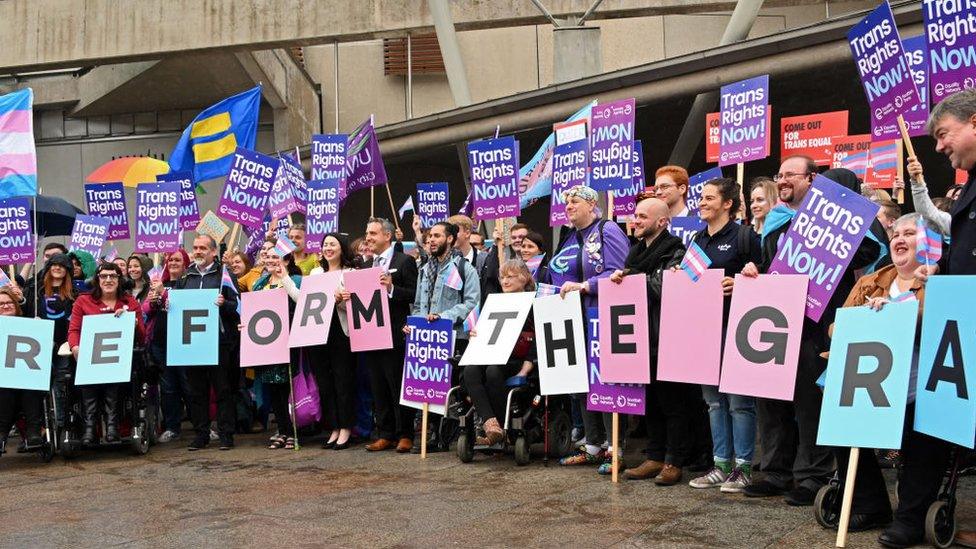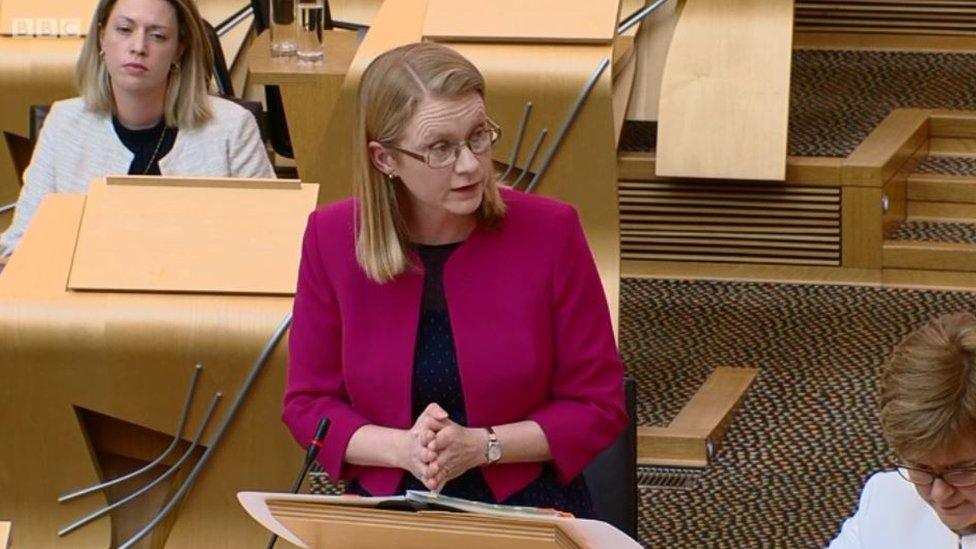Scottish transgender reforms put on hold
- Published

Trans rights campaigners have rallied outside Holyrood to call for reforms
Controversial plans to make it easier for people in Scotland to change their legally recognised gender have been put on hold.
The Scottish government has stressed that it is still committed to updating the Gender Recognition Act.
But it said the new legislation would only been introduced after further consultations are held to build "maximum consensus".
The reforms have faced heavy criticism from several prominent SNP politicians.
The concerns have largely focused on the potential impact of allowing people to self-identify their gender in single-sex spaces such as changing rooms, and women-only shortlists.
Social Security Secretary Shirley Anne Somerville told Holyrood on Thursday that she was "acutely aware of how divided opinion is".
And she acknowledged that "there may be many people who are not happy with what I'm proposing, either because I'm not going fast enough in the proposals or because they don't want us to do anything".
'Valid concerns'
She told MSPs that the government remains committed to reforming the rules so that trans people can get a gender recognition certificate without "unnecessary stress".
But she said she wanted to "build maximum consensus" and address "valid concerns" before formally tabling legislation.
She said a draft bill would be published later in the year, but would not be fully introduced to parliament until there has been a "full consultation on the precise details".
A previous consultation on the proposals ended in March of this year.
Some opposition MSPs raised concerns that legislation now might not be brought forward in time to pass during the current parliamentary term.
Campaign group Stonewall Scotland said they were pleased the government was still committed to introducing the reforms, but said it was "vital" that this passed before the 2021 election.

Shirley Anne Somerville told MSPs that she wanted to build consensus over the reforms
What is the Scottish government proposing?
Transgender people who want to change their legally recognised gender are able to apply under the Gender Recognition Act (GRA).
But in order to do so, they must satisfy a panel that they have, or have had, gender dysphoria - distress as a result of the sex and gender they were assigned at birth - and produce two medical reports detailing this diagnosis.
They must also have lived in their acquired gender for at least two years, and make a formal declaration that they intend to continue to do so for the rest of their life.
The Scottish government believes this process is intrusive and outdated, and wants to move to a "self-declaration" model.
This would mean applicants no longer need to have been diagnosed with gender dysphoria, or prove that they have been living as their acquired gender for two years - although applicants would ultimately have to live in their acquired gender for "at least six months" before being granted recognition.
Similar laws are already in place in countries including Ireland, Denmark, Norway and Argentina.
The government is also considering lowering the age that a person can apply to change their legally-recognised gender from 18 to 16.
Why is this controversial?
Concerns have been raised that allowing people to self-identify their gender could damage the legal protections given to women under the Equality Act - including the right to single-sex spaces such as changing rooms, and women-only shortlists.
In April, 15 senior SNP politicians - including three government ministers - wrote a letter to the Scotsman newspaper urging the Scottish government not to "rush" into "changing the definition of male and female".
They argued that many people are "only now developing an understanding of the implications of the self-identification of sex, particularly on women".
And it warned that "conflating sex with gender identification affects a wide range of policy and service delivery, including data collection, education, health and social care, justice and sport.
"Changing the definition of male and female is a matter of profound significance. It is not something we should rush."
The letter came a week after it emerged that three female SNP MSPs - Ruth Maguire, Ash Denham and Gillian Martin - accused First Minister Nicola Sturgeon of being "out of step" with her colleagues over transgender rights in a private online conversation that was subsequently leaked.
Ms Denham is the Scottish government's community safety minister, while Ms Maguire is convener of Holyrood's equalities and human rights committee.
How has the government responded to these concerns?
Ms Somerville told MSPs that the main concerns that had been raised were not about trans women, but about men who seek to abuse women and who would "misuse trans equality" to do so.
She said it would remain a criminal offence to make a false declaration, and that the process would remain a "significant undertaking" which "requires the same level of commitment from the individual as the existing system does".
On the provision of single-sex or women only spaces, she said the plans would not affect the current position, under the Equality Act, where trans people can be excluded from some places "where that is proportionate and justifiable".
The minister said the government would listen to and address the concerns of those who think the changes will increase the risks women face from men.
Ms Somerville also said she would "seek to build confidence that achieving equality and dignity for trans men and women is possible without diminishing the rights of anyone else".
Where does Nicola Sturgeon stand on it?
The first minister says she is on a mission to "make Scotland fairer for transgender people". In a speech at the United Nations in New York earlier this year, she argued that many of the concerns that had been raised by feminists were "misplaced".
Ms Sturgeon added: "As an ardent, passionate feminist, and have been all of my life, I don't see the greater recognition of transgender rights as a threat to me as a woman or to my feminism.
"But I think there is a need to bring different parts of this debate together and to try to find the way forward that will respect the rights of transgender people and recognizes and hopefully addresses some of the concerns that are expressed."
Ms Sturgeon sat next to Ms Somerville as she made her Holyrood statement, with the minister echoing her words that "I don't feel a conflict between my support for women's rights and for trans rights" - but adding that "I know and understand that many do".